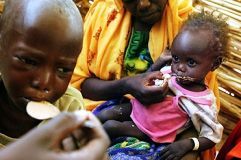More than 80 infants dies each day in Darfur – UNICEF
Oct 07, 2006 (MELLIT) — Myriam Ibrahim doesn’t like to talk about her daughter Fawzia, the smallest of three triplets born in May who died last month in north Darfur after struggling to keep alive despite a lack of milk and medical care.
 “Fawzia started having fever, then diarrhea, and then she died. It was a month ago,” Ibrahim, 28, said with the soft, sad smile — a mark of Darfurian women recounting their survival.
“Fawzia started having fever, then diarrhea, and then she died. It was a month ago,” Ibrahim, 28, said with the soft, sad smile — a mark of Darfurian women recounting their survival.
Fawzia is among the 80 children under age 5 who die each day in Darfur because of malnutrition, disease and generally poor living conditions created by violence in this barren region of western Sudan, the U.N. Children’s Fund estimates.
When Ibrahim gave birth to her triplets in May, stress and lack of food left her with no milk for her daughters.
Fawzia weighed barely three pounds and had a tube in her nose to feed her liquid proteins when an Associated Press reporter met with the family in June at a hospital in El Fasher, North Darfur’s capital.
After emergency care at the hospital, the triplets and their mother went back to their hometown of Mellit, about 30 miles (48 kilometers) north.
But when Ibrahim, who has three other children, returned to Mellit, the violence in the region had driven off aid workers, and she was among some 350,000 people who were deprived of any medical or food aid.
Thirteen humanitarian workers were killed over the summer due to rebel infighting and a large government offensive. As a result, humanitarian workers have withdrawn from large stretches Darfur in recent months, leaving sick children with virtually no medical care.
“Lack of access and the humanitarian pullout likely means that child mortality is going to go up again rapidly,” said Jonathan Vietch, the UNICEF emergency chief for Sudan.
More than 200,000 people have been killed and 2.5 million displaced in three years of fighting between the government and rebels in Darfur.
An ill-equipped and understaffed African Union peacekeeping force has tried to quell the violence but has not succeeded. Meanwhile, Sudan’s President Omar al-Bashir has repeatedly rejected allowing a stronger U.N. peacekeeping force to replace the AU troops in the region.
Aid workers, who began to return to Mellit late September, said Thursday they didn’t know what killed Fawzia, but believed the baby could have been saved if they’d been able to access her town earlier.
When Mellit was cut off from humanitarian aid, Ibrahim said she’d had to ration powdered milk for the triplets. Even now with only two babies left, both of whom are in reasonably good health, she said she only has enough milk left to last a week.
Awatif Khalil, a visiting government nutritionist, said Mellit’s clinic doesn’t have the money to bring in powdered milk to the clinic.
“It’s up to parents to buy it in pharmacies in El Fasher,” she said.
But Ibrahim’s husband and the babies’ father, Ahmed Adem, said he couldn’t afford to travel to El Fasher to get the milk with the little money he makes selling fruits on the market.
“Anyhow, the road is still much too unsafe to go to El Fasher,” he added.
A German humanitarian group working with the World Food Program recently dropped some aid in Mellit, a tense town guarded by several Sudanese army check points.
But future distributions remain unpredictable in the wartorn region. Residents in the area said their village was bombed by government planes as recently as last week. Rogue rebel factions also rampage nearby.
The WFP says its budget of more than US$520 million (A410.6 million) will enable it to feed most needy Darfurians through 2006, if they can be reached. But the agency says its food stocks will begin to run down by January, and it could face a shortfall by March without more international contributions.
Ibrahim depends on aid to feed her family. She said she can’t cultivate her fields because she fears militias may rape and loot her if she walks out of town to the fields.
“If food doesn’t arrive soon, I don’t know what my children are going to eat,” Ibrahim said.
(AP/ST)
